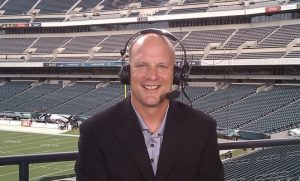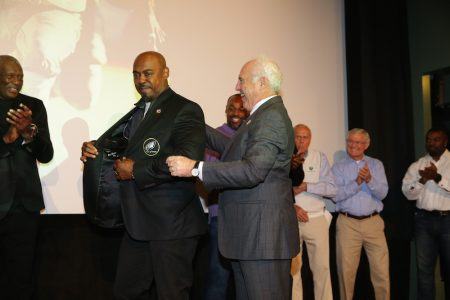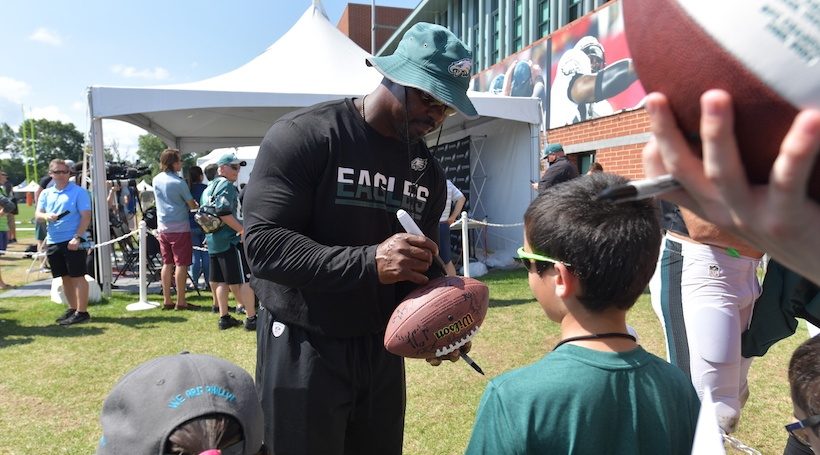
Dave Spadaro; Photo courtesy Philadelphia Eagles
There are no special privileges for Brian Dawkins off the field. He is a “grinder,” as they say in the NFL personnel business. The job of being a “personnel evaluator” may sound glamorous, but the reality is that Dawkins watches video of draft-eligible players every day, back and forth and once again, and then he writes reports and turns in his opinion.
And he couldn’t be happier.
A 15-year NFL veteran who played for the Eagles from 1996 through 2008 before finishing his professional career with three seasons in Denver, Dawkins had his jersey No. 20 retired upon his immediate induction into the Philadelphia Eagles Hall of Fame in 2012. He retired to his Denver home, raised his kids, took out the trash, was a youth coach and cleaned up the kitchen after dinner. He enjoyed it all.
Then Dawkins felt the itch. The football bug had its fangs out and was gnawing away at him.
Dawkins wanted back into the game at the professional level. He missed the competition. He longed for the camaraderie. The idea of helping build a championship team appealed to him.
So Dawkins reached out to the Eagles organization and came onboard last summer, first as a scout as part of the Nunn-Wooten Scouting Fellowship Program provided to every team by the NFL, and then as a full-time operations executive. Dawkins reports every day to the NovaCare Complex in South Philadelphia, trading in his cleats for a video remote control, his most prized professional tool.
Dawkins is a rookie in a world of grizzled veterans who know that the success rate of projecting college players into NFL stars is 40 to 50 percent each year.
“I’m learning everything,” Dawkins says about his job. “When you’re a player, you don’t see what is behind the curtain, and you can’t appreciate how much time is put into the evaluation of players and everything that goes into that. It’s not something where you just turn on the tape and watch it, and it’s done. There is so much that goes into it, including spending time meeting players and finding out about them and what makes them tick.
“This is a very inexact science. Having 21-, 22-year-old young men come into a league like this, where the players are grown and experienced, it’s a huge transition. Everything changes from college to the NFL. I learned it as a player, and now I’m learning it from a completely different perspective. I love it. Every day is a new challenge for me.”
In 1996, Dawkins was the young man entering the big-boy world of the NFL. He was, as the scouting reports said, “an undersized prospect who has cornerback coverage skills but might be a better fit at this level as a safety.” The Eagles selected Dawkins in the second round of the draft that year, 61st overall, from Clemson. Many say it was one of the greatest draft decisions the franchise has ever made.
Now Dawkins has come full circle, in a sense. He’s learning the business side of an industry that has exploded since he came in as a rookie player. The NFL is a booming enterprise, and the role of a front-office executive is much more demanding than simply evaluating talent and projecting 21-year-old boys into a 27-year-old man’s game. There is a salary cap to navigate. There is locker-room chemistry to consider. A roster limit of 90 players in the off-season is whittled to 53 for the regular season, plus a 10-player practice squad made up of developing players.
“Every move matters. Every single thing you do has an impact, and that works for me,” Dawkins says. “I like putting in the details. I like the little things, because I know the only way you can achieve greatness is to detail your work and finish your tasks. I’m here to absorb, and it’s been great.”

Philadelphia Eagles Hall of Fame Jacket Ceremony
Dawkins, a finalist for the Pro Football Hall of Fame in his first year of eligibility, doesn’t speak directly about his big-picture plans. For someone like Dawkins, who shoots for the stars every day of his life, running a football organization in the NFL seems like a reasonable goal. He just saw a peer, John Lynch, turn a long NFL career as a player and then an eight-year stint in the broadcast booth into a job as the general manager of the San Francisco 49ers.
Anything is possible when you believe that, truly, anything is possible.
That is the essence of Dawkins, who is a relentlessly optimistic man with a deep faith and a work ethic that demands success. If he is going to put his mind into something, then he’s also going to devote his energies and his focus in the same direction and the end result will be, naturally, success.
“I believe we are all here to give meaning to life and to maximize all the opportunities we are fortunate to receive,” Dawkins says. “I’m going to give it my all, no matter what I’m doing.”
This gig is something different for Dawkins, no question about it. As a player he could spend as much time as he wanted in the weight room, and when he emerged, Dawkins could feel the difference. In his role in the Eagles’ front office, it is a much more developing process. Much slower. Watching a college safety from every game in 2016 – and rewinding every play five times – isn’t the least bit glamorous. There are no shortcuts here, not with reports to file and interviews to conduct and a pecking order of players to establish.
There is more to player evaluation than simply beauty in the eye of the beholder.
“Brian obviously knows what he’s looking at, and he’s shown us that he can break it down and give great information,” says Eagles vice president of player personnel Joe Douglas. “He’s been in there grinding, just like all of us. It’s good to have him as an asset, lending his valuable experience. He’s been a big help.”
This is just a start of a post-player professional life for Dawkins, who admits he doesn’t know where it will lead. This is a business in which you don’t look far down the road, because there are just too many obstacles in the path. It is a step-by-step profession, so it’s fair to say that big, bad Brian Dawkins, who was fearless and tenacious on the field, is taking baby steps understanding the job.
He is to be judged by the evaluations he makes, the reports he writes and the voice he has building the Philadelphia Eagles back into a Super Bowl-contending team.
“Whatever I can do to help the Philadelphia Eagles win the Super Bowl, I’m going to do it,” Dawkins says. “There is so much to learn here. I love that challenge. Nobody is going to give me anything. That’s the way it was for me as a player, and that’s the way it is for me in this capacity.
“I’m just going to keep my head down, work as hard as I can and be honest in what I see from players and in my evaluations of them on and off the football field.”
And with that, Dawkins turns back to his video monitor, remote control in hand, looking for the next star player. How does he find a young man who wants it more than anyone else, as Dawkins did in his playing days? How does he look into the eyes of a player and grade the heart? That’s the challenge Dawkins has accepted, and he is here working his way up the ladder, pushing harder and demanding more from himself along the way.
Eagles Insider Dave Spadaro has covered every Eagles game since 1987 and is seen and heard throughout the year on television, radio and Eagles coverage everywhere. You can hear his Eagles Live Podcast on iTunes.














